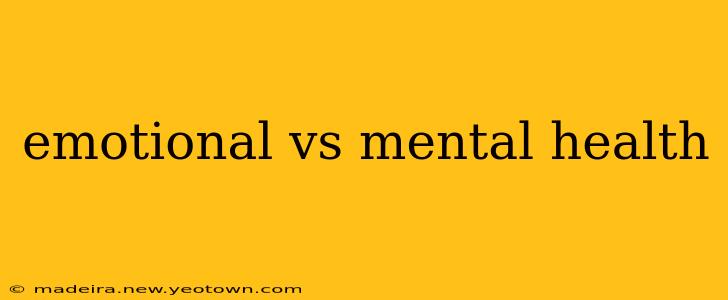The terms "emotional health" and "mental health" are often used interchangeably, leading to confusion. While closely related, they represent distinct aspects of our overall well-being. Imagine them as two interwoven threads making up the rich tapestry of our inner lives. One thread, emotional health, deals with our capacity to feel, express, and manage a wide spectrum of emotions. The other, mental health, encompasses our cognitive functions – our thoughts, perceptions, and how we process information. Let's unravel these threads and understand their individual contributions to our overall well-being.
What is Emotional Health?
Emotional health is about our ability to navigate the rollercoaster of human emotions. It's not about being perpetually happy; it's about acknowledging, accepting, and managing the full range of feelings – from joy and excitement to sadness, anger, and fear. Think of it as emotional intelligence – understanding your own emotions and the emotions of others. Someone with good emotional health can:
- Identify and label their feelings: They understand what they are feeling and can articulate it.
- Express their emotions healthily: They can express their feelings in appropriate ways, without resorting to harmful behaviors.
- Cope with challenging emotions: They have strategies to deal with difficult emotions like stress, anxiety, or grief.
- Build and maintain healthy relationships: They can connect with others, empathize, and navigate interpersonal dynamics effectively.
A person with poor emotional health might struggle to identify their feelings, might react impulsively to emotions, or might have difficulty forming and maintaining relationships due to emotional dysregulation.
What is Mental Health?
Mental health, on the other hand, refers to our cognitive well-being. It encompasses our thinking processes, our ability to learn and make decisions, our memory, and our overall psychological well-being. This includes our ability to:
- Think clearly and rationally: Make sound judgments and solve problems effectively.
- Learn and retain information: Effectively process new information and apply it to different situations.
- Cope with stress and adversity: Develop resilience in the face of challenging circumstances.
- Maintain a positive self-image: Develop a healthy sense of self-worth and confidence.
Poor mental health can manifest as difficulties concentrating, experiencing persistent negative thoughts, struggling to cope with stress, or experiencing significant changes in mood or behavior. Mental health conditions like depression, anxiety, and schizophrenia affect cognitive functioning.
How Are Emotional and Mental Health Related?
Emotional and mental health are intricately intertwined. Our emotions significantly impact our thoughts and cognitive processes. For instance, intense anxiety can cloud judgment and impair concentration. Similarly, negative thought patterns can fuel feelings of sadness and hopelessness. A healthy balance between the two is crucial for overall well-being. When one aspect falters, it often affects the other.
Can You Have Good Mental Health But Poor Emotional Health?
Yes. It's possible to be highly intelligent and capable of complex thinking (good mental health) but struggle to manage emotions effectively (poor emotional health). Someone might be adept at problem-solving at work but struggle to express their needs in personal relationships, for example.
Can You Have Good Emotional Health But Poor Mental Health?
Yes, again. This scenario is less common but entirely possible. Someone might be highly emotionally intelligent, able to connect deeply with others and manage their feelings effectively, but still struggle with underlying mental health conditions such as depression that affect their cognitive functioning.
How to Improve Both Emotional and Mental Health
Improving both emotional and mental health involves a holistic approach. This includes:
- Mindfulness and meditation: Practicing mindfulness can improve emotional regulation and reduce stress.
- Physical exercise: Regular physical activity boosts mood and reduces symptoms of anxiety and depression.
- Healthy diet: Nourishing your body with healthy food supports both mental and emotional well-being.
- Sufficient sleep: Getting enough quality sleep is essential for cognitive function and emotional stability.
- Social connection: Building and maintaining strong social connections provides support and reduces feelings of isolation.
- Seeking professional help: If you are struggling with your mental or emotional health, don't hesitate to seek help from a therapist or counselor.
In conclusion, while closely related, emotional and mental health are distinct aspects of our overall well-being. Understanding the nuances between the two allows for a more comprehensive approach to self-care and seeking help when needed. Nurturing both is key to living a fulfilling and balanced life.

